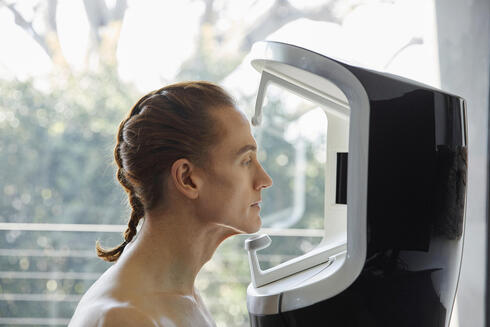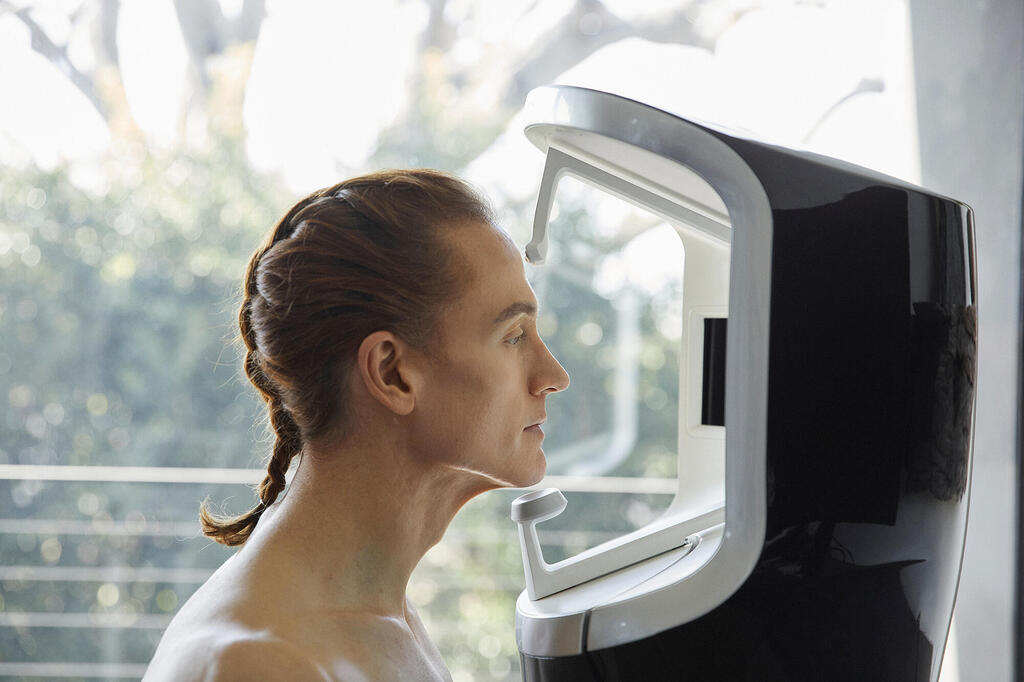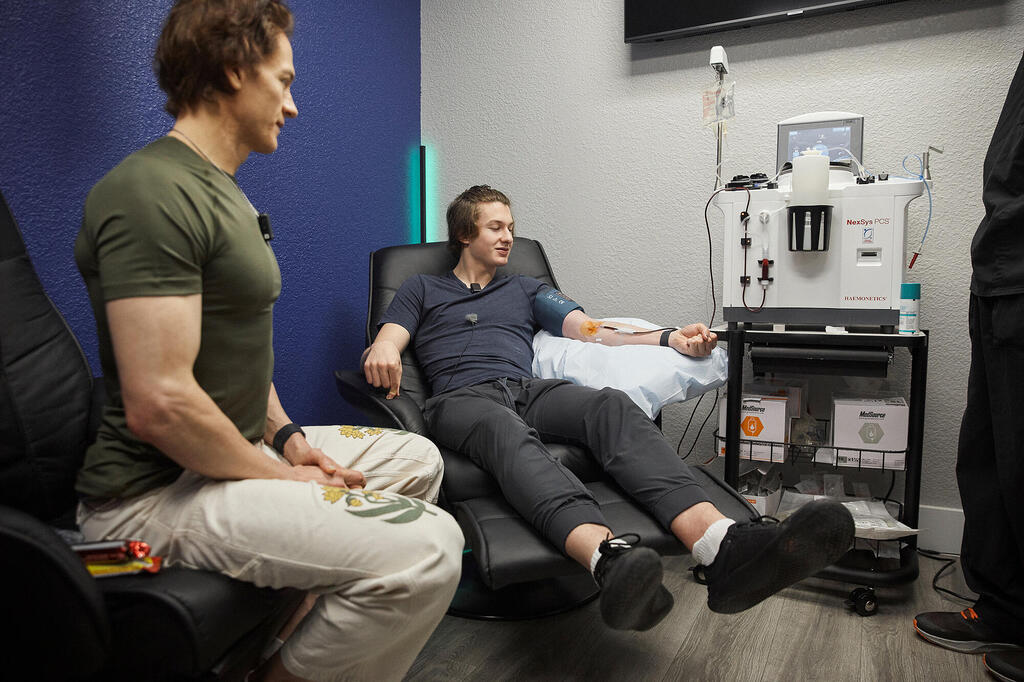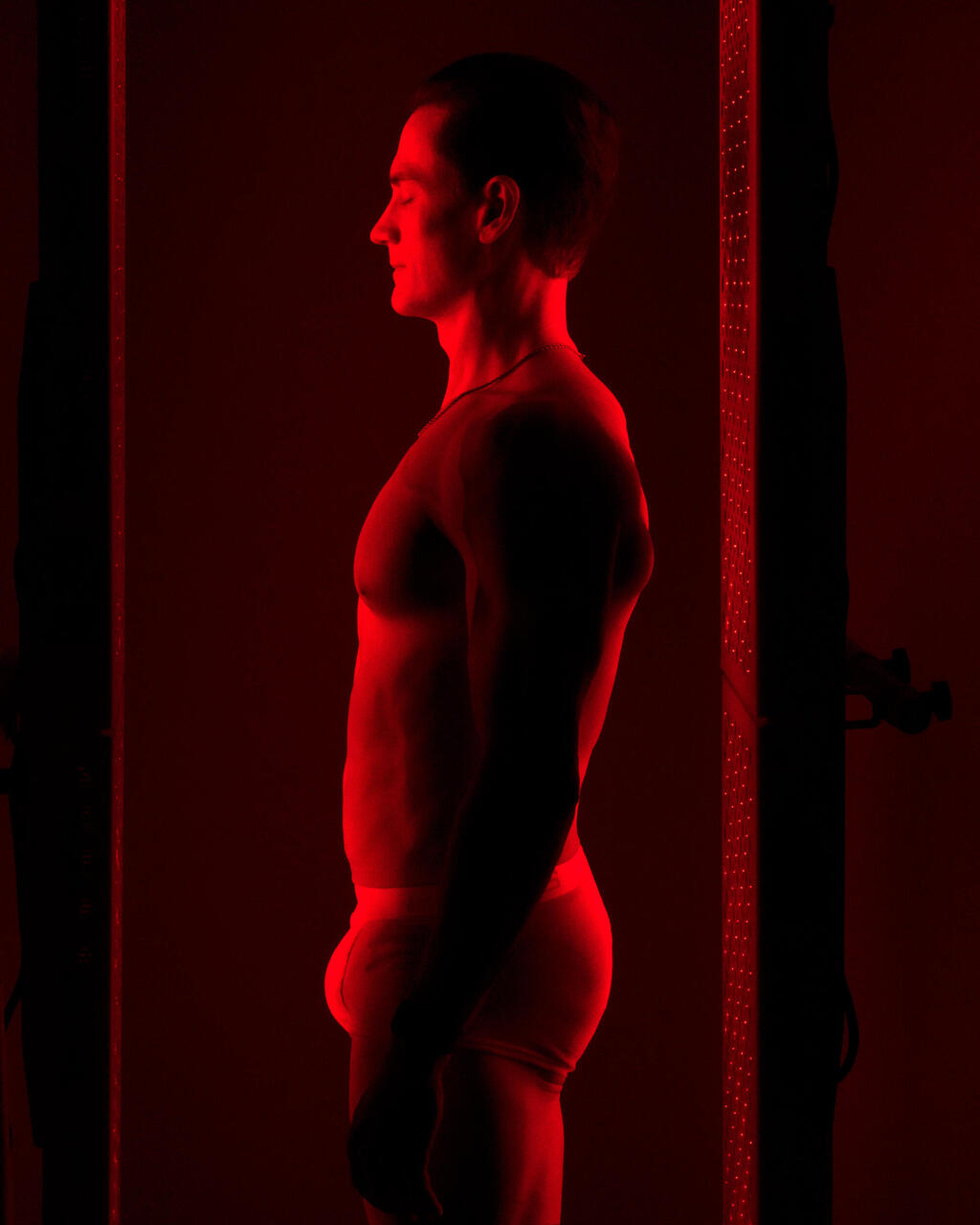
Forever young? Multi-millionaire believes he can beat death
111 nutritional supplements a day, a hat that shoots laser beams into his head, blood transfusions from his teenage son, and 30 researchers who analyze him 24/7: Bryan Johnson, a multi-millionaire who made his fortune selling a payment application, is convinced that he can beat death, or at least live another 200 years
Bryan Johnson doesn't want to die. In this sense he is not unusual. However, unlike most of us, the 46-year-old Johnson is a multi-millionaire high-tech entrepreneur who decided to really work at it, and in recent years he has been devoting the best of his energy and fortune to defeating death: for this he takes 111 nutritional supplements a day, wears a hat that shoots laser beams at his head to rejuvenate his cells, he eats dinner at 11:30 a.m. (yes, in the morning), and goes to bed with a penile device, which monitors his nighttime erections (this week he proudly tweeted that from August he improved his performance and now has about three hours of erection each night, almost like the penis of an average 18 year-old, which is erect for 3.5 hours in average).
And that's not all. Johnson likes to call himself "the most measured person in history." About 30 doctors and scientists check his data every day - from daily stool samples to countless intestinal photographs (according to various reports, he already has in his possession more than 30,000 such photographs). They are also constantly conducting a series of new experiments on him, for example injecting his 18-year-old son's blood into his body - all this to correct and perfect Johnson's rejuvenation regimen.
Most people would probably snicker at someone who looks like another billionaire trying to be God, or at least be "the maniac who will stop time", but Johnson is convinced he will be the one who will have the last laugh. "It's a new idea, and when people come across new ideas they simply don't know how to process them, so they say the first thing that comes to their mind," he says in an exclusive interview with Calcalist. "But every day we are careful when crossing the road, throw away moldy food and put on a seat belt in the car. So basically every person in the world is playing 'don't die', and we have gotten increasingly better at it over time, and as evidence - our lifespanshave extended. So the future, as far as I'm concerned, is simple: To become really, really good at not dying."
And yet, the longevity industry is trying to extend life expectancy, while your goal is much more ambitious - to defeat death.
"Let's try a different framing - take for example an accomplished and respected athlete like LeBron James. When you see him eating well and going to bed on time and doing all the things he does for his health and wellness, you don't say 'LeBron James is crazy' or 'LeBron James is surely suffering,' right? You say: 'I respect him, because he is an athlete, because he is plays well on the court and because he is dedicated to his craft.' So I devote myself to the sport of rejuvenation. There are those who think, 'How terrible ', and there are those who find it makes them want to observe and better understand what I do."
Do you consider yourself an athlete?
"People don't understand. They look at me and ask themselves: Is he a biohacker (a person trying to improve their body independently)? Is he a billionaire trying to live forever? Trying to put me in a box confuses them, so I created a new category — I define myself as a professional rejuvenation athlete. This framing allows you to say, 'Okay, I respect this guy for chasing something that is hard to achieve. The idea is simply to get people to adapt to a new concept. My goal is to reach a longevity escape velocity - that despite every year that passes, my body will remain at the same biological age."
The longevity industry is controversial, and even senior scientists with a reputation have not yet been able to register proven achievements in the field among humans. Why would you, who doesn't have their experience and knowledge, actually succeed?
"Have you visited my site?", he answers without blinking, and then starts shooting data at me. "My bone mineral density is in the top 0.02% of 30-year-olds, my cardiovascular capacity is in the top 1.5% of 18-year-olds, and my speed of aging is among the very best among thousands of people who routinely measure it. So take your pick."
Say no to every stimulus
The longevity field is one of the trendiest fields in the biotech industry, and has already attracted high-profile investors, including Jeff Bezos (Altos Labs) and Peter Thiel, one of the founders of PayPal. Investments in the sector are expected to reach $600 billion as early as next year. And yet something about Johnson evokes unusual emotions. Is it the fact that he spends an estimated $2 million a year on his routine? Is it because he employs a whole team of researchers to measure him obsessively? And perhaps this is because Johnson's vision—whose pale skin equates to a vampiric appearance, and the blood transfusions he received from his son do not help eliminate this mental image—is nothing but a blatant abstraction of everything that makes us human. After all, as he admitted in an interview with "Time" magazine last September, the idea of eating pizza is more painful than pleasurable for him, and women hate him, according to him, among other things because he avoids small talk, goes to bed alone at 8:30 p.m., in a room devoid of any stimulation, and declares that "they are simply not my priority".
His life routine doesn't sound human either: he wakes up naturally from his sleep sometime between 4:40-6:00 in the morning, and immediately begins his measurement routine: weight, body mass, body temperature, hydration levels, fat and more. Next he turns on a UV lamp, which imitates natural sunlight, for 2-3 minutes to "restart the body's rhythm", takes the first two pills of the day - vitamin C and ferritin to increase iron levels in the blood and meditates for 10 minutes.
He follows that with washing his face, applies anti-wrinkle cream and puts on a laser mask for 5 minutes, which sends out blue and red rays that are supposed to encourage collagen production (the common protein in the human body, which is a main component of connective tissues). Then he drips anti-cataract drops into his eyes, then activates a vibrating device on the sides of his nose, which he says stimulates the nerve that helps the eyes produce tears.
After the first meal - which is actually a seaweed shake with nutritional supplements - he begins an hour-long fitness workout, after which he will eat the second meal of the day - steamed vegetables and lentils ground into a puree. The rest of his day will include more tests, nutritional supplements, "dinner" before 12 noon (in total Johnson states he eats 2,250 calories a day) and time to commune with his thoughts and breaths.
The matter of quality breathing is critical to Johnson - his mansion in Venice, California, is equipped with air filters with obsessive care for the quality of the air he breathes, to the point that the door of the house is not left open so that the air inside is not polluted.
Johnson devotes the early evening hours to biofeedback therapy that lasts half an hour. After that, he uses an FDA-approved gadget to increase tear production, and devotes time to a skin care routine, which includes, among other things, peptide serums and creams with hyaluronic acid, and oral care. At 8:30 in the evening he goes to bed, and according to him he falls asleep within four minutes on average.
As the conversation with Johnson progresses, it becomes more and more apparent that he is not interested in resembling a human being, at least not a 21st century human being. In his life project, which he calls "blueprint protocol", he deals with future humanity - that of the 25th century. "It's the product of a thought experiment," he explains, "where I imagined the forms of intelligence that will exist in the 25th century looking at the 21st century with a detached, objective perspective, and asking: 'What did we do at the beginning of the 21st century that allowed intelligence to thrive in this part of the galaxy?' I thought about this problem for about a decade, and it seems to me the answer is: do not to die."
What do you mean?
"After several billion years of evolution, we are currently baby steps away from the creation of superintelligence. The fact that we have artificial intelligence may be the solution to all our problems. And given such a situation, the only foe becomes death.
"We as human beings try not to die. We look left and right when we cross the road, and we are still willing to smoke a cigarette while doing so. That is, we are willing to die in the long run - we just don't want to die now.
"What I'm trying to do is figure out if I can become the embodiment of 'not dying' — it's a philosophical shift that says let's assume that our death is not inevitable, and then we'll play our game of existence very differently."
And does it work?
"There is an aging rate index, called DNA methylation, according to which my speed of aging is in the mid point 60s. That means if you age from January to December, I stop aging in August, and get September to December for free. So my speed of aging is lowered by the equivalent of 31 years, and I accumulate aging damage at a speed slower than 88% of 18-year-olds,."
How much money have you already spent on your routine?
"A few million dollars."
And how much more will you spend?
"As much as needed".
From a Mormon missionary to a fintech tycoon
Bryan Johnson grew up in a small Mormon community in Utah. At the age of 19, he became a Mormon missionary, and lived for two years in Ecuador, from which he returned with a goal: to fix the human race. He has a BA in International Relations from Brigham Young University in Utah, and an MBA from the University of Chicago. He founded, among other things, the investment fund OS Fund and the Kernel company that produces helmets for brain monitoring. In 2007, he founded Braintree, a company for clearing online payments, and in 2012 it acquired the mobile payment app Venmo for $26.2 million. Within a year, Braintree was acquired by PayPal for $800 million, and the exit made Johnson, the sole founder of the company, a multi-millionaire.
Despite the huge success, Johnson was unhappy at the time - he was overweight and suffered from depression, and his marriage to the mother of his three children fell apart. "Around my early thirties, my body and mind were beginning to feel ... vintage," he writes in his book Don't Die, which was self-published last year and is available for free download. "I needed repairs that I had never learned how to do. Then things grew dire. Everything about me was at stake. My very life was at stake. Instead of giving in to my own demise, I decided to go toe-to-toe with the Fates. David vs. Goliath. Bryan Johnson vs. Time. Every single one of my cells was worn down. At first, most doctors told me that this breakdown was inevitable. Age, they said, with a shrug. A one-way battle, they said. No turning back." But Johnson refused to accept it.
He recruited a medical team of about 30 professionals, volunteered for any experimental treatment that could contribute to his stated goal of returning to the biological age of 18, and devoted himself to a meticulous and extremely demanding routine, which includes daily fitness training, a spartan diet in which "every calorie has to fight for its life" (as he says in one of his viral videos) and endless measurements. He also reports on all of this on his X account, which has 223,000 followers. Last week, for example, he tweeted that he had reduced the age of his sperm by 15 years in the past year, "probably due to (use of patches of) exogenous testosterone."
Johnson recently also launched Blueprint as a start-up, which is currently a company selling food products and nutritional supplements, such as olive oil and macadamia and walnut butter. But his pretensions are to make the venture a way of life. Today, there are three people besides Johnson who maintain his extreme lifestyle: Kate Tolo (27), Blueprint's marketing director, maintains it almost completely (and as the first woman in the experiment, she is called "Blueprint XX"), and his 18-year-old son and 13-year-old daughter are partially on the regimen.
But with all due respect to Johnson's pretensions, the longevity field is indeed highly hyped, but has difficulty producing technological breakthroughs, even in much more focused and wide-ranging experiments.
Last July, Prof. Charles Brenner, director of the research department at the City of Hope Medical Center in Los Angeles, who became famous for his research on extending life expectancy, told Calcalist that the entire field is "bullshit", full of "storytellers who know what will really speak to people." According to him, he "does not foresee technological developments that will significantly extend the maximum lifespan and I certainly do not foresee eternal life. Scientists who promote such technological innovations greatly exaggerate the ability to extend lifespan, and will continue to promise too much and deliver too little."
Johnson is not moved by the things. "Let's say you're a scientist and you say, 'You know what, it doesn't matter what someone's maximum oxygen uptake is (VO2 max, a factor that can determine an athlete's ability to perform sustained physical activity in the field of aerobic endurance)' - even though it's one of the most studied indicators in the field - 'it is not relevant to the aging of the body'. OK, so ignore that and you still have 15-20 other markers to dig into.
"I'm just doing things and sharing my data. And then we say: 'Okay, it seems that maximum oxygen uptake is one of the measurements most associated with longevity, and also bone density.' And it's very difficult to argue with my results. In the artery calcification index, for example, anyone who understands anything about health and quality of life understands that I am one of the healthiest people in the world."
Still, there is no shortage of people who will argue with Johnson, even within the longevity industry. One of them is Prof. Nir Barzilai, one of the world's leading researchers in the field, director and founder of the Institute for Aging Research at the Albert Einstein School in New York. "There is a deep philosophical difference between us," Barzilai told Calcalist, "He is an immortalist, he does not want to die, and I am not. As someone who is older than him, I understand his frustration and the desire to remain young - because something can be done about aging, and we are a little behind in this field and could be in a much better situation - but death cannot be prevented."
Philosophy aside, both of you are basically exploring the body. So what's the problem with his method?
"First of all, this is an experiment by one person, and it doesn't work that way, because we all differ from each other in so many parameters. I, for example, have mice in the laboratory, which I connect like Siamese twins, young and old, and check if the blood that passes from the young to the old will rejuvenate the old. It's not one mouse, because that's how science works. But with him - what difference will it make? Suppose it works for another person, what scientific value is there in that? You can't learn anything from the results of one person and the things he does.
"The second and more important thing is that I went through all the hundred or so medications and nutritional supplements he takes. If you look at each of them individually, you can understand why they caught his attention. From his use of them it is clear that he assumes that if he adds one and another and another, then they will connect or even become more synergistic, meaning that one will make the other even better - but he is wrong. Some of the supplements he takes actually interfere with each other."
Like what?
"Johnson takes Metformin (a common diabetes drug, which is being studied as having the potential to extend life) and does a lot of exercise, but we know the two don't work well together, because Metformin inhibits muscle growth. His biological age is under 50 and Metformin is harmful to people under the age of 50 because it lowers their growth hormones, and lowers their testosterone."
So he is doing an experiment on himself, which might prove otherwise. Why would it bother you?
"Because I'm afraid that more people will look at him and say, 'I want to be Bryan Johnson,' and I don't know if Johnson will live — but they can certainly die. Because each of us is genetically different, lives in a different place with different access to resources — and it's impossible to mimic another person’s experiment.
"Besides, he does things in a very extreme way. I look at him, and see that he has almost no fat under the skin. And while visceral fat is very bad, we need the fat inside the skin, partly because it has hormones. And people who are born without such fat have a huge metabolic problem, because the fat gets into their other organs. I'm not kidding when I say that Johnson could die from this and the other extreme things he did. And I'm afraid of people copying him."
He maintains a medical staff of 30 people. None of them tell him that Metformin and exercise go against each other? Isn’t that strange?
"That's how it works in a cult. Everyone will find a way to support what the leader wants."
"I'm not deviant, I'm an innovator"
Bryan, we've talked a lot about what happens if you fail. But if I were you, I would be more worried about what would happen if you succeeded? With the climate crisis, epidemics, wars, retreat in democracy and the threats of artificial intelligence - why the hell would anyone want to live another 200 years?
"If we were solely reliant on humans for a different, better future, I would be pretty forlorn. But the potential of artificial intelligence is enormous. That does not mean that it will necessarily be amazing or that it will not wipe out the human race. But given the speed at which it is developing and its raw capabilities, I have hope that it will be able to rescue us from the challenging situation we are in."
Are you saying that in 200 years there will be other life forms?
"I say that we are baby steps away from superintelligence, and for the first time in the history of the human race we have no ability to predict what is going to happen even in the next six months. There has never been such a wall of fog before us."
But if you plan to live another 200 years, it's even scarier.
"You are mapping knowing with the emotional feeling of security and unknowing with the emotional state of fear. This is a common biological reaction, which we humans can be aware of. But there’s no reason why the unknown is a bad thing, and there is no reason why it should inherently cause fear in us. It is simply an adapted trait - to understand that we will manage in unfamiliar spaces just as well as we manage in familiar spaces."
Until then - doesn't that sentence you to a very lonely present? You spend a great deal of time of your day on your routine, and that probably doesn't leave you much time for things like a social life.
"This is a question you can address to any person who dedicates themselves to their craft, to any professional athlete or professional who does it with great dedication. Your question actually implies that I am somehow an abberation, when in fact what I do reflects what many do in society. I simply chose a completely new sport to play. And what I'm trying to do is to not accept the premise that it's some oddball endeavour. I simply created a new category."
















